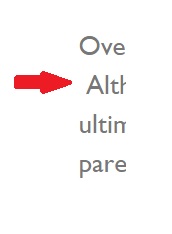 Writing legal blog posts, just like any kind of writing, is a skill. Just like any other skill, there are hundreds or even thousands of little “rules” or “guidelines” to keep in mind that can make you write better. Regardless of whether you want your blog to focus on showing off your legal chops or build your SEO, following the right rules can be what it takes for one of your blog readers to pick up the phone, call your law office, and hire you to solve their legal problem.
Writing legal blog posts, just like any kind of writing, is a skill. Just like any other skill, there are hundreds or even thousands of little “rules” or “guidelines” to keep in mind that can make you write better. Regardless of whether you want your blog to focus on showing off your legal chops or build your SEO, following the right rules can be what it takes for one of your blog readers to pick up the phone, call your law office, and hire you to solve their legal problem.
Here are four random writing tips that the professional legal bloggers at Myers Freelance use on a daily basis.
Remind Yourself of Your Audience
Choosing who you’re going to write for is an integral part of crafting your legal blog. The decision depends on your practice area, the kinds of clients you like working with, and your own personality. Once you decide, though, every blog post needs to target that audience. Equally importantly, though, every paragraph and every sentence in each post needs to stay focused on that audience. Wavering from your targeted audience to another one creates a shift in tone that can sow distrust in your targeted readers. It doesn’t gain readers, either, because they will be alienated by the tone of the rest of the blog, and will not be brought back by the inconsistency.
Don’t Double-Space After a Period
Hitting the spacebar twice after a period is controversial in plenty of circumstances. Legal blogging, however, is not one of them. Double-spacing after a period inevitably leads to a sentence that begins on a new line. If you double-space, the first letter on that new line will be randomly indented from the full-left position, making it look unprofessional.

There are some content management systems that handle double-spaces after periods well. Most, though, do not.
Stay Cohesive
Rambling or over-explaining can confuse or talk down to readers, which alienates them and makes them look for another attorney. This is why 500 is a good word count to target in your blog posts. It forces you to write about a small topic, synthesize it effectively, and keep to your point. If you don’t, you’ll quickly find yourself over your word count.
Edit Ruthlessly
Can’t make a paragraph fit in with the rest of your blog post? Cut it. Shed no tears. Instead, put it in a new document and save it for later. It might spur you into writing a new post on a new topic once you reread it.
Legal Blogging Professionals at Myers Freelance
In their years of experience writing legal blogs for attorneys across a variety of practice areas, these are just a tiny sample of the numerous tips used by the professional legal blog writers at Myers Freelance.